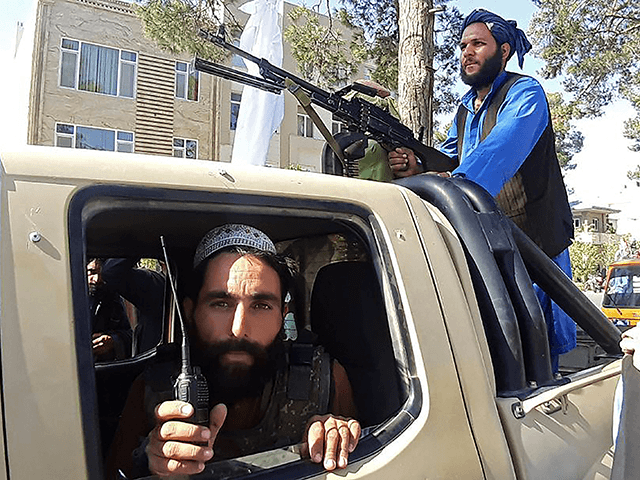Taliban terrorists claim they added the capitals of Herat, Kandahar, Badghis, and Helmand provinces to their string of conquests in about 12 hours on Thursday, moving on to attack government forces in the heart of two more provinces, Ghor and Zabul.
Afghanistan’s Tolo News reported parts of the four ostensibly captured cities are still partly under government control. Officials in Kabul refrained from making any official statement on the status of the cities on Friday morning.
The Taliban captured veteran militia commander and warlord Ismail Khan in Herat, along with the provincial governor and several top security officials. The jihadists uploaded videos of Khan, age 70, in their custody to social media. They later allowed Khan to return to his residence after negotiating with the Taliban, which claimed he has agreed to join forces with them.
Daoud Laghmani, governor of Ghazni province, was arrested on Thursday by government troops, along with his deputy and chief of staff, because he handed most of his province over to Taliban control. Some other regional officials have openly joined the Taliban after their cities were invaded.
Kandahar is the birthplace of the Taliban movement, founded by Mullah Omar in 1996, and was the focus of intense sustained fighting between Taliban forces and American troops after the U.S. military “surge” began in 2010. Escapees from Kandahar said it was captured Thursday without resistance, to the great jubilation of Taliban-supporting residents, marking the symbolic “rebirth” of the Islamic Emirate, the Taliban’s name for its dominion over Afghanistan.
Taliban conquerors claimed they would offer a general amnesty to former employees of the U.S.-backed government in Kabul and urged the city to function as normal, even asking local traffic cops to man their posts and help clear up traffic jams. However, photos smuggled out of the city showed the bodies of police officers who appear to have been executed and several top city officials have gone missing.
The governor of Uruzgan province told Tolo News on Friday he is negotiating surrender with the Taliban at the urging of local elders, who feared casualties and damage from a prolonged battle against the group.
The Taliban now controls 18 provincial capitals after eight days of conquest, giving them half of Afghanistan’s capital cities and over two-thirds of its total land area. Only two major cities besides Kabul are still under government control: Jalalabad in the east and Mazar-i-Sharif in the north.
Abdullah Abdullah, head of the High Council for National Reconciliation and narrowly-defeated challenger to current president Ashraf Ghani in the last election, on Friday requested an emergency session of the U.N. Security Council (UNSC) to address the situation in Afghanistan.
Abdullah said the Taliban have killed thousands of civilians, and displaced hundreds of thousands more, and warned their imminent conquest of the country represents a major threat to global security.

COMMENTS
Please let us know if you're having issues with commenting.